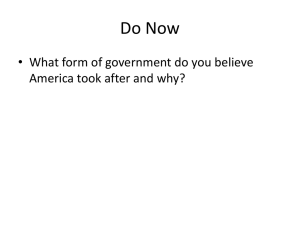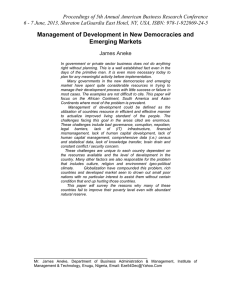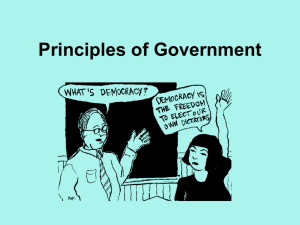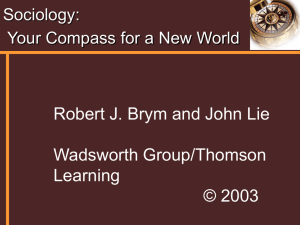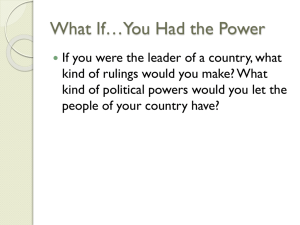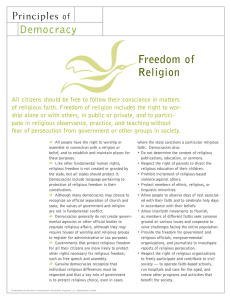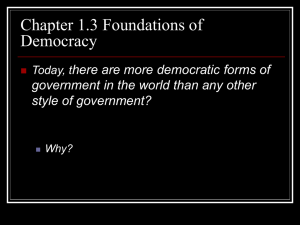James Fenimore Cooper, selections from The American Democrat
advertisement
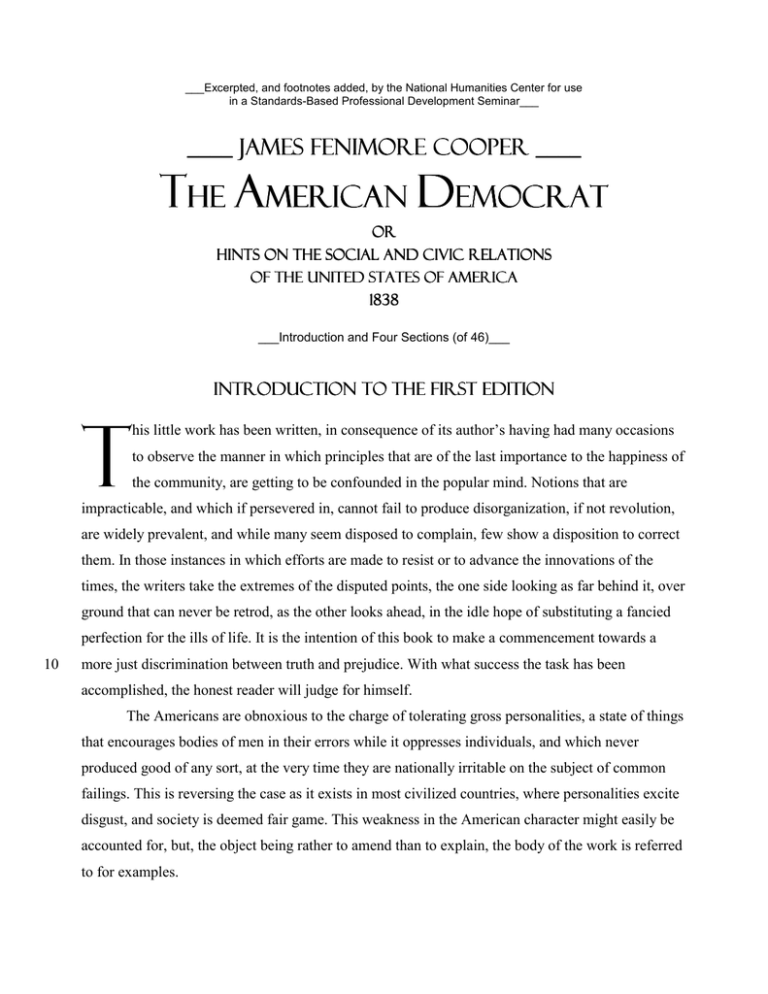
___Excerpted, and footnotes added, by the National Humanities Center for use in a Standards-Based Professional Development Seminar___ ____ James Fenimore Cooper ____ THE AMERICAN DEMOCRAT OR HINTS ON THE SOCIAL AND CIVIC RELATIONS OF THE UNITED STATES O OF F AmericA 1838 ___Introduction and Four Sections (of 46)___ INTRODUCTION TO THE FIRST EDITION T his little work has been written, in consequence of its author’s having had many occasions to observe the manner in which principles that are of the last importance to the happiness of the community, are getting to be confounded in the popular mind. Notions that are impracticable, and which if persevered in, cannot fail to produce disorganization, if not revolution, are widely prevalent, and while many seem disposed to complain, few show a disposition to correct them. In those instances in which efforts are made to resist or to advance the innovations of the times, the writers take the extremes of the disputed points, the one side looking as far behind it, over ground that can never be retrod, as the other looks ahead, in the idle hope of substituting a fancied perfection for the ills of life. It is the intention of this book to make a commencement towards a 10 more just discrimination between truth and prejudice. With what success the task has been accomplished, the honest reader will judge for himself. The Americans are obnoxious to the charge of tolerating gross personalities, a state of things that encourages bodies of men in their errors while it oppresses individuals, and which never produced good of any sort, at the very time they are nationally irritable on the subject of common failings. This is reversing the case as it exists in most civilized countries, where personalities excite disgust, and society is deemed fair game. This weakness in the American character might easily be accounted for, but, the object being rather to amend than to explain, the body of the work is referred to for examples. Power always has most to apprehend from its own illusions. Monarchs have incurred more 20 hazards from the follies of their own that have grown up under the adulation of parasites, than from the machinations of their enemies; and, in a democracy, the delusion that would elsewhere be poured into the ears of the prince, is poured into those of the people. It is hoped that this work, while free from the spirit of partizanship, will be thought to be exempt from this imputation. The writer believes himself to be as good a democrat as there is in America. But his democracy is not of the impracticable school. He prefers a democracy to any other system, on account of its comparative advantages, and not on account of its perfection. He knows it has evils; great and increasing evils, and evils peculiar to itself; but he believes that monarchy and aristocracy have more. It will be very apparent to all who read this book, that he is not a believer in the scheme of raising men very far above their natural propensities. 30 A long absence from home, has, in a certain degree, put the writer in the situation of a foreigner in his own country; a situation probably much better for noting peculiarities, than that of one who never left it.1 Two things have struck him painfully on his return; a disposition in the majority to carry out the opinions of the system to extremes, and a disposition in the minority to abandon all to the current of the day, with the hope that this current will lead, in the end, to radical changes. Fifteen years since, all complaints against the institutions were virtually silenced, whereas now it is rare to hear them praised, except by the mass, or by those who wish to profit by the favors of the mass. In the midst of these conflicting opinions, the voice of simple, honest, and what, in a country like this, ought to be fearless, truth, is nearly smothered; the one party effecting its ends by fulsome, 40 false and meretricious eulogiums, in which it does not itself believe, and the other giving utterance to its discontent in useless and unmanly complaints. It has been the aim of the writer to avoid both these errors also. No attempt has been made to write very profound treatises on any of the subjects of this little book. The limits and objects of the work forbade it; the intention being rather to present to the reader those opinions that are suited to the actual condition of the country, than to dwell on principles more general. A work of the size of this might be written on the subject of “Instruction” alone, but it has been the intention to present reasons and facts to the reader, that are peculiarly American, rather than to exhaust the subjects. 1 Cooper travelled in Europe from 1826 to 1833. 2 Had a suitable compound offered, the title of this book would have been something like 50 “Anti-Cant,” for such a term expresses the intention of the writer, better, perhaps, than the one he has actually chosen. The work is written more in the spirit of censure than of praise, for its aim is correction; and virtues bring their own reward, while errors are dangerous. on American Equality T he equality of the United States is no more absolute than that of any other country. There may be less inequality in this nation than in most others, but inequality exists, and, in some respects, with stronger features than it is usual to meet with in the rest of christendom. 60 The rights of property being an indispensable condition of civilization, and its quiet possession every where guarantied, equality of condition is rendered impossible. One man must labor, while another may live luxuriously on his means; one has leisure and opportunity to cultivate his tastes, to increase his information, and to refine his habits, while another is compelled to toil, that he may live. One is reduced to serve, while another commands, and, of course, there can be no equality in their social conditions. The justice and relative advantage of these differencies, as well as their several duties, will be elsewhere considered. By the inequality of civil and political rights that exists in certain parts of the Union, and the great equality that exists in others, we see the necessity of referring the true character of the 70 institutions to those of the states, without a just understanding of which, it is impossible to obtain any general and accurate ideas of the real polity of the country. The same general exceptions to civil and political equality, that are found in other free countries, exist in this, though under laws peculiar to ourselves. Women and minors are excluded from the suffrage, and from maintaining suits at law, under the usual provisions, here as well as elsewhere. None but natives of the country can fill many of the higher offices, and paupers, felons and all those who have not fixed residences, are also excluded from the suffrage. In a few of the states property is made the test of political rights, and, in nearly half of them, a large portion of the inhabitants, who are of a different race from the original European occupants of the soil, are entirely excluded from all political, and from many of the civil rights, that are enjoyed by those who are 80 deemed citizens. A slave can neither choose, nor be chosen to office, nor, in most of the states, can 3 even a free man, unless a white man. A slave can neither sue nor be sued; he can not hold property, real or personal, nor can he, in many of the states be a witness in any suit, civil or criminal. It follows from these facts, that absolute equality of condition, of political rights, or of civil rights, does not exist in the United States, though they all exist in a much greater degree in some states than in others, and in some of the states, perhaps, to as great a degree as is practicable. In what are usually called the free states of America, or those in which domestic slavery is abolished, there is to be found as much equality in every respect as comports with safety, civilization and the rights of property. This is also true, as respects the white population, in those states in which domestic slavery does exist; though the number of the bond is in a large proportion to that of the 90 free. As the tendency of the institutions of America is to the right, we learn in these truths, the power of facts, every question of politics being strictly a question of practice. They who fancy it possible to frame the institutions of a country, on the pure principles of abstract justice, as these principles exist in theories, know little of human nature, or of the restraints that are necessary to society. Abuses assail us in a thousand forms, and it is hopeless to aspire to any condition of humanity, approaching perfection. The very necessity of a government at all, arises from the impossibility of controlling the passions by any other means than that of force. The celebrated proposition contained in the declaration of independence is not to be understood literally. All men are not “created equal,” in a physical, or even in a moral sense, unless 100 we limit the signification to one of political rights. This much is true, since human institutions are a human invention, with which nature has had no connection. Men are not born equals, physically, since one has a good constitution, another a bad; one is handsome, another ugly; one white, another black. Neither are men born equals morally, one possessing genius, or a natural aptitude, while his brother is an idiot. As regards all human institutions men are born equal, no sophistry being able to prove that nature intended one should inherit power and wealth, another slavery and want. Still artificial inequalities are the inevitable consequences of artificial ordinances, and in founding a new governing principle for the social compact, the American legislators instituted new modes of difference. The very existence of government at all, infers inequality. The citizen who is preferred to 110 office becomes the superior of those who are not, so long as he is the repository of power, and the child inherits the wealth of the parent as a controlling law of society. All that the great American proposition, therefore, can mean, is to set up new and juster notions of natural rights than those 4 which existed previously, by asserting, in substance, that God has not instituted political inequalities, as was pretended by the advocates of the Jus Divinum,2 and that men possessed a full and natural authority to form such social institutions as best suited their necessities. There are numerous instances in which the social inequality of America may do violence to our notions of abstract justice, but the compromise of interests under which all civilized society must exist, renders this unavoidable. Great principles seldom escape working injustice in particular things, and this so much the more, in establishing the relations of a community, for in them many 120 great, and frequently conflicting principles enter, to maintain the more essential features of which sacrifices of parts become necessary. If we would have civilization and the exertion indispensable to its success, we must have property; if we have property, we must have its rights; if we have the rights of property, we must take those consequences of the rights of property which are inseparable from the rights themselves. The equality of rights in America, therefore, after allowing for the striking exception of domestic slavery, is only a greater extension of the principle than common, while there is no such thing as an equality of condition. All that can be said of the first, is that it has been carried as far as a prudent discretion will at all allow, and of the last, that the inequality is the simple result of civilization, unaided by any of those factitious plans that have been elsewhere devised in order to 130 augment the power of the strong, and to enfeeble the weak. Equality is no where laid down as a governing principle of the institutions of the United States, neither the word, nor any inference that can be fairly deduced from its meaning, occurring in the constitution. As respect the states, themselves, the professions of an equality of rights are more clear, and slavery excepted, the intention in all their governments is to maintain it, as far as practicable, though equality of condition is no where mentioned, all political economists knowing that it is unattainable, if, indeed, it be desirable. Desirable in practice, it can hardly be, since the result would be to force all down to the level of the lowest. All that a good government aims at, therefore, is to add no unnecessary and artificial aid to the force of its own unavoidable consequences, and to abstain from fortifying and accumulating 140 social inequality as a means of increasing political inequalities. 2 Jus Divinum: divine law. 5 advantages advantages of a democracy T he principal advantage of a democracy, is a general elevation in the character of the people. If few are raised to a very great height, few are depressed very low. As a consequence, the average of society is much more respectable than under any other form of government. The vulgar charge that the tendency of democracies is to levelling, meaning to drag all down to the level 150 of the lowest, is singularly untrue, its real tendency being to elevate the depressed to a condition not unworthy of their manhood. In the absence of privileged orders, entails and distinctions, devised permanently to separate men into social castes, it is true none are great but those who become so by their acts, but, confining the remark to the upper classes of society, it would be much more true to say that democracy refuses to lend itself to unnatural and arbitrary distinctions, than to accuse it of a tendency to level those who have a just claim to be elevated. A denial of a favor, is not an invasion of a right. Democracies are exempt from the military charges, both pecuniary and personal, that become necessary in governments in which the majority are subjects, since no force is required to repress those who, under other systems, are dangerous to the state, by their greater physical power. 160 As the success of democracies is mainly dependant on the intelligence of the people, the means of preserving the government are precisely those which most conduce to the happiness and social progress of man. Hence we find the state endeavoring to raise its citizens in the scale of being, the certain means of laying the broadest foundation of national prosperity. If the arts are advanced in aristocracies, through the taste of patrons, in democracies, though of slower growth, they will prosper as a consequence of general information; or as a superstructure reared on a wider and more solid foundation. Democracies being, as nearly as possible, founded in natural justice, little violence is done to the sense of right by the institutions, and men have less occasion than usual, to resort to fallacies and false principles in cultivating the faculties. As a consequence, common sense is more 170 encouraged, and the community is apt to entertain juster notions of all moral truths, than under systems that are necessarily sophisticated. Society is thus a gainer in the greatest element of happiness, or in the right perception of the different relations between men and things. Democracies being established for the common interests, and the publick agents being held in constant check by the people, their general tendency is to serve the whole community, and not small portions of it, as is the case in narrow governments. It is as rational to suppose that a hungry 6 man will first help his neighbor to bread, when master of his own acts, as to suppose than any but those who feel themselves to be truly public servants, will first bethink themselves of the publick, when in situations of publick trust. In a government of one, that one and his parasites will be the first and best served; in a government of a few, the few; and in a government of many, the many. 180 Thus the general tendency of democratical institutions is to equalize advantages, and to spread its blessings over the entire surface of society. Democracies, other things being equal, are the cheapest form of government, since little money is lavished in representation, and they who have to pay the taxes, have also, directly or indirectly, a voice in imposing them. Democracies are less liable to popular tumults than any other polities, because the people, having legal means in their power to redress wrongs, have little inducement to employ any other. The man who can right himself by a vote, will seldom resort to a musket. Grievances, moreover, are less frequent, the most corrupt representatives of a democratick constituency generally standing in awe of its censure. 190 As men in bodies usually defer to the right, unless acting under erroneous impressions, or excited by sudden resentments, democracies pay more respect to abstract justice, in the management of their foreign concerns, than either aristocracies or monarchies, an appeal always lying against abuses, or violations of principle, to a popular sentiment, that, in the end, seldom fails to decide in favor of truth. In democracies, with a due allowance for the workings of personal selfishness, it is usually a motive with those in places of trust, to consult the interests of the mass, there being little doubt, that in this system, the entire community has more regard paid to its wants and wishes, than in either of the two others. 200 on the disadvantages of democracy D emocracies are liable to popular impulses, which, necessarily arising from imperfect information, often work injustice from good motives. Tumults of the people are less apt to occur in democracies than under any other form of government, for, possessing the legal means of redressing themselves, there is less necessity to resort to force, but, public opinion constituting, virtually, the power of the state, measures are more apt to be influenced by sudden 7 mutations of sentiment, than under systems where the rulers have better opportunities and more leisure for examination. There is more feeling and less design in the movements of masses than in 210 those of small bodies, except as design emanates from demagogues and political managers. The efforts of the masses that are struggling to obtain their rights, in monarchies and aristocracies, however, are not to be imputed to democracy; in such cases, the people use their natural weapon, force, merely because they are denied any participation in the legal authority. When democracies are small, these impulses frequently do great injury to the public service, but in large states they are seldom of sufficient extent to produce results before there is time to feel the influence of reason. It is, therefore, one of the errors of politicians to imagine democracies more practicable in small than in large communities, an error that has probably arisen from the fact that, the ignorance of masses having hitherto put men at the mercy of the combinations of the affluent and intelligent, democracies have been permitted to exist only in countries insignificant by their 220 wealth and numbers. Large democracies, on the other hand, while less exposed to the principal evil of this form of government, than smaller, are unable to scrutinize and understand character with the severity and intelligence that are of so much importance in all representative governments, and consequently the people are peculiarly exposed to become the dupes of demagogues and political schemers, most of the crimes of democracies arising from the faults and designs of men of this character, rather than from the propensities of the people, who, having little temptation to do wrong, are seldom guilty of crimes except through ignorance. Democracies are necessarily controlled by publick opinion, and failing of the means of obtaining power more honestly, the fraudulent and ambitious find a motive to mislead, and even to 230 corrupt the common sentiment, to attain their ends. This is the greatest and most pervading danger of all large democracies, since it is sapping the foundations of society, by undermining its virtue. We see the effects of this baneful influence, in the openness and audacity with which men avow improper motives and improper acts, trusting to find support in a popular feeling, for while vicious influences are perhaps more admitted in other countries, than in America, in none are they so openly avowed. It may also be urged against democracies, that, nothing being more corrupting than the management of human affairs, which are constantly demanding sacrifices of permanent principles to interests that are as constantly fluctuating, their people are exposed to assaults on their morals from this quarter, that the masses of other nations escape. It is probable, however, that this evil, 8 240 while it ought properly to be enumerated as one of the disadvantages of the system, is more than counterbalanced by the main results, even on the score of morals. The constant appeals to public opinion in a democracy, though excellent as a corrective of public vices, induce private hypocrisy, causing men to conceal their own convictions when opposed to those of the mass, the latter being seldom wholly right, or wholly wrong. A want of national manliness is a vice to be guarded against, for the man who would dare to resist a monarch, shrinks from opposing an entire community. That the latter is quote often wrong, however, is abundantly proved by the fact, that its own judgments fluctuate, as it reasons and thinks differently this year, or this month even, from what it reasoned and thought the last. The tendency of democracies is, in all things, to mediocrity, since the tastes, knowledge and 250 principles of the majority form the tribunal of appeal. This circumstance, while it certainly serves to elevate the average qualities of a nation, renders the introduction of a high standard difficult. Thus do we find in literature, the arts, architecture and in all acquired knowledge, a tendency in America to gravitate towards the common center in this, as in other things; lending a value and estimation to mediocrity that are not elsewhere given. It is fair to expect, however, that a foundation so broad, may in time sustain a superstructure of commensurate proportions, and that the influence of masses will in this, as in the other interests, have a generally beneficial effect. Still it should not be forgotten that, with the exception of those works, of which, as they appeal to human sympathies or the practices of men, an intelligent public is the best judge, the mass of no community is qualified to decide the most correctly on any thing, which, in its nature, is above its reach. 260 It is a besetting vice of democracies to substitute publick opinion for law. This is the usual form in which masses of men exhibit their tyranny. When the majority of the entire community commits this fault it is a sore grievance, but when local bodies, influenced by local interests, pretend to style themselves the publick, they are assuming powers that properly belong to the whole body of the people, and to them only under constitutional limitations. No tyranny of one, nor any tyranny of the few, is worse than this. All attempts in the publick, therefore, to do that which the publick has no right to do, should be frowned upon as the precise form in which tyranny is the most apt to be displayed in a democracy. Democracies, depending so much on popular opinion are more liable to be influenced to their injury, through the management of foreign and hostile nations, than other governments. It is 270 generally known that, in Europe, secret means are resorted to, to influence sentiment in this way, and we have witnessed in this country open appeals to the people, against the acts of their servants, 9 in matters of foreign relations, made by foreign, not to say, hostile agents. Perhaps no stronger case can be cited of this weakness on the part of democracies, than is shown in this fact, for here we find men sufficiently audacious to build the hope of so far abusing opinion, as to persuade a people to act directly against their own dignity and interests. The misleading of publick opinion in one way or another, is the parent of the principal disadvantages of a democracy, for in most instances it is first corrupting a community in order that it may be otherwise injured. Were it not for the counteracting influence of reason, which, in the end, seldom, perhaps never fails to assert its power, this defect would of itself, be sufficient to induce all 280 discreet men to decide against this form of government. The greater the danger, the greater the necessity that all well-intentioned and right-minded citizens should be on their guard against its influence. It would be hazardous, however, to impute all the peculiar faults of American character, to the institutions, the country existing under so many unusual influences. If the latter were overlooked, one might be induced to think frankness and sincerity of character were less encouraged by popular institutions than was formerly supposed, close observers affirming that these qualities are less frequent here, than in most other countries. When the general ease of society is remembered, there is unquestionably more deception of opinion practised than one would naturally expect, but this failing is properly to be imputed to causes that have no necessary 290 connection with democratical institutions, though men defer to publick opinion, right or wrong, quite as submissively as they defer to princes. Although truths are not smothered altogether in democracies, they are often temporarily abandoned under this malign influence, unless there is a powerful motive to sustain them at the moment. While we see in our own democracy this manifest disposition to defer to the wrong, in matters that are not properly subject to the common sentiment, in deference to the popular will of the hour, there is a singular boldness in the use of personalities, as if men avenged themselves for the restraints of the one case by a licentiousness that is without hazard. The base feelings of detraction and envy have more room for exhibition, and perhaps a stronger incentive in a democracy, than in other forms of government, in which the people get 300 accustomed to personal deference by the artificial distinctions of the institutions. This is the reason that men become impatient of all superiority in a democracy, and manifest a wish to prefer those who affect a deference to the publick, rather than those who are worthy. 10 an aristocrat and a democrat W e live in an age, when the words aristocrat and democrat are much used, without regard to the real significations. An aristocrat is one of a few, who possess the political power of a country; a democrat, one of the many. The words are also properly applied to those who entertain notions favorable to aristocratical, or democratical forms of 310 government. Such persons are not, necessarily, either aristocrats, or democrats in fact, but merely so in opinion. Thus a member of a democratical government may have an aristocratical bias, and vice versa. To call a man who has the habits and opinions of a gentleman, an aristocrat, from that fact alone, is an abuse of terms, and betrays ignorance of the true principles of government, as well as of the world. It must be an equivocal freedom, under which every one is not the master of his own innocent acts and associations, and he is a sneaking democrat, indeed, who will submit to be dictated to, in those habits over which neither law nor morality assumes a right of control. Some men fancy that a democrat can only be one who seeks the level, social, mental and moral, of the majority, a rule that would at once exclude all men of refinement, education and taste 320 from the class. These persons are enemies of democracy, as they at once render it impracticable. They are usually great sticklers for their own associations and habits, too, though unable to comprehend any of a nature that are superior. They are, in truth, aristocrats in principle, though assuming a contrary pretension; the ground work of all their feelings and arguments being self. Such is not the intention of liberty, whose aim is to leave every man to be the master of his own acts; denying hereditary honors, it is true, as unjust and unnecessary, but not denying the inevitable consequences of civilization. The law of God is the only rule of conduct, in this, as in other matters. Each man should do as he would be done by. Were the question put to the greatest advocate of indiscriminate association, whether he would submit to have his company and habits dictated to him, he would be 330 one of the first to resist the tyranny; for they, who are the most rigid in maintaining their own claims, in such matters, are usually the loudest in decrying those whom they fancy to be better off than themselves. Indeed, it may be taken as a rule in social intercourse, that he who is the most apt to question the pretensions of others, is the most conscious of the doubtful position he himself occupies; thus establishing the very claims he affects to deny, by letting his jealousy of it be seen. Manners, education and refinement, are positive things, and they bring with them innocent tastes 11 which are productive of high enjoyment; and it is as unjust to deny their possessors their indulgence, as it would be to insist on the less fortunate’s passing the time they would rather devote to athletic amusements, in listening to operas for which they have no relish, sung in a language they do not understand. 340 All that democracy means, is as equal a participation in rights as is practicable; and to pretend that social equality is a condition of popular institutions, is to assume that the latter are destructive of civilization, for, as nothing is more self-evident than the impossibility of raising all men to the highest standard of tastes and refinement, the alternative would be to reduce the entire community to the lowest. The whole embarrassment on this point exists in the difficulty of making men comprehend qualities they do not themselves possess. We can all perceive the difference between ourselves and our inferiors, but when it comes to a question of the difference between us and our superiors, we fail to appreciate merits of which we have no proper conceptions. In face of this obvious difficulty, there is the safe and just governing rule, already mentioned, or that of permitting every one to be the undisturbed judge of his own habits and associations, so long as they 350 are innocent, and do not impair the rights of others to be equally judges for themselves. It follows, that social intercourse must regulate itself, independently of institutions, with the exception that the latter, while they withhold no natural, bestow no factitious advantages beyond those which are inseparable from the rights of property, and general civilization. In a democracy, men are just as free to aim at the highest attainable places in society, as to obtain the largest fortunes; and it would be clearly unworthy of all noble sentiment to say, that the grovelling competition for money shall alone be free, while that which enlists all the liberal acquirements and elevated sentiments of the race, is denied the democrat. Such an avowal would be at once, a declaration of the inferiority of the system, since nothing but ignorance and vulgarity could be its fruits. 360 The democratic gentleman must differ in many essential particulars, from the aristocratical gentleman, though in their ordinary habits and tastes they are virtually identical. Their principles vary; and, to a slight degree, their deportment accordingly. The democrat, recognizing the right of all to participate in power, will be more liberal in his general sentiments, a quality of superiority in itself; but, in conceding this much to his fellow man, he will proudly maintain his own independence of vulgar domination, as indispensable to his personal habits. The same principles and manliness that would induce him to depose a royal despot, would induce him to resist a vulgar tyrant. 12 There is no more capital, though more common error, than to suppose him an aristocrat who maintains his independence of habits; for democracy asserts the control of the majority, only, in 370 matters of law, and not in matters of custom. The very object of the institution is the utmost practicable personal liberty, and to affirm the contrary, would be sacrificing the end to the means. An aristocrat, therefore, is merely one who fortifies his exclusive privileges by positive institutions, and a democrat, one who is willing to admit of a free competition, in all things. To say, however, that the last supposes this competition will lead to nothing, is an assumption that means are employed without any reference to an end. He is the purest democrat who best maintains his rights, and no rights can be dearer to a man of cultivation, than exemptions from unseasonable invasions on his time, by the coarse-minded and ignorant. 13
